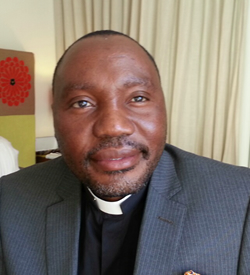

Follow these links to find out more about the Health Policy Project's related work.
- Explore HPP publications that relate to Faith Based Organizations
- Read about HPP's work with Key Populations
Organization: Global Interfaith Network on Sex, Sexual Orientation, Gender Identity and Expression
Country: South Africa
Area of Response to HIV: Key Populations, Faith Based Organizations
Interview was originally published in the August 2015 newsletter.
Interview with Reverend MacDonald Sembereka
Reverend MacDonald Sembereka was named executive director of the Johannesburg-based Global Interfaith Network on Sex, Sexual Orientation, Gender Identity and Expression in May 2015. He leads the organization's efforts to create dialogue and safe spaces for religious communities to interact and engage with sexual and gender minorities. These interactions are intended to increase the number of faith-based advocacy voices on these issues. The HIV Policy and Advocacy Monitor spoke with Reverend MacDonald about his previous work and his goals for the growing organization.
HIV Policy and Advocacy Monitor: Can you tell us a bit about your personal history and your work in the response to HIV?
My passion is to create a just and humane society for all people. This passion has led me to work as a social worker; a hospice chaplain; an advisor to Joyce Banda, the former president of Malawi; a human rights activist; and a priest. Through my experiences in social work, I made a connection between the violation of human rights and the HIV epidemic. I began to examine the human rights aspects of the epidemic, especially in terms of ensuring access to treatment, services for all, and government support to people affected by or living with HIV.
Early in my career, I lost some of my villagers to the HIV epidemic. The potential for stigma from others knowing about their condition kept them from seeking lifesaving treatment; this realization ignited my quest to fight for the rights of people living with HIV. We must strive to prevent stigma and discrimination in the faith community, in and beyond the context of HIV.
HIV Policy and Advocacy Monitor: Why is advocacy important in the response to HIV?
Advocacy, to me, is about accountability and justice, and ensuring that those responsible for the safety and welfare of others adequately provide what is required of them. Anyone who holds public office or whose salary is provided by taxpayers is given the citizens' trust—they must be held accountable for their actions and how they spend taxpayer dollars. When it comes to HIV treatment access, this means ensuring that no one is left behind, untreated. In my experience, providers are often reluctant to provide services because of their own perceptions of stigma; it occurred to me that broad approaches might be necessary—both at service delivery points and in the community to address drivers of stigma—to end this bottleneck.
HIV Policy and Advocacy Monitor: Why are faith-based organizations important in the HIV response?
First, faith-based organizations provide 30-70 percent of general health services in sub-Saharan Africa; they cannot be ignored. Second, there have been both faith-driven stigma and cases in which faith communities and governments align to promote stigma and discrimination. Faith entities must stand up to these powers. Particularly in Africa, faith has a moral obligation to help shift the national discourse, policy development, and public perceptions of people living with HIV. I think the voice of the faith community—especially the voice of reason within faith—is imperative to offer a compelling reason to ensure service provision for all and to hold those in power accountable.
HIV Policy and Advocacy Monitor: Can more be done to engage religious leaders in the response to HIV?
Faith communities provide tremendous support to HIV efforts globally, although some organizations ignore this role. Larger organizations must broaden their scope to establish partnerships and support the work undertaken by faith-based organizations. The Global Interfaith Network embodies the cooperative aspect of partnerships, where we can work to share ideas and lessons learned, as well as focus on generating and sharing data.
In this regard, though, I think that a divide remains within the spectrum of faith-based organizations; some remain conservative, while others adopt a more progressive approach. Our network must ensure continued engagement from these progressive entities by providing technical, moral, and financial support. Furthermore, given the potential impact of progressive faith-based organizations, the international community needs to engage with them to the extent that it engages with secular organizations. Faith-based organizations have strong bonds with their constituents and possess both the voice and the perception of moral ground to advance positive interventions within communities. They are often the ones who provide services to the hardest-to-reach populations, and their endorsements of ideas or concepts are taken seriously in African nations.
HIV Policy and Advocacy Monitor: What are the main policy priorities for you and the Global Interfaith Network?
At this point, our main priorities—both in Africa and globally—include the decriminalization of sodomy and the development of inclusive and universal policies, both within and outside the health sector. There can be no meaningful human development if we leave groups behind; our focus is to provide safe spaces for everyone and protection to all.